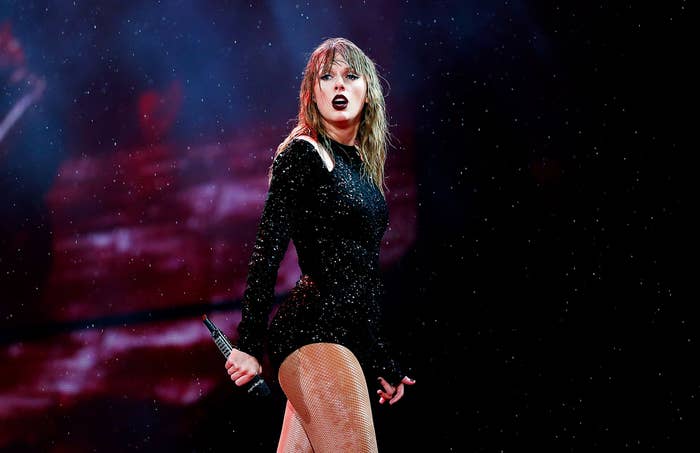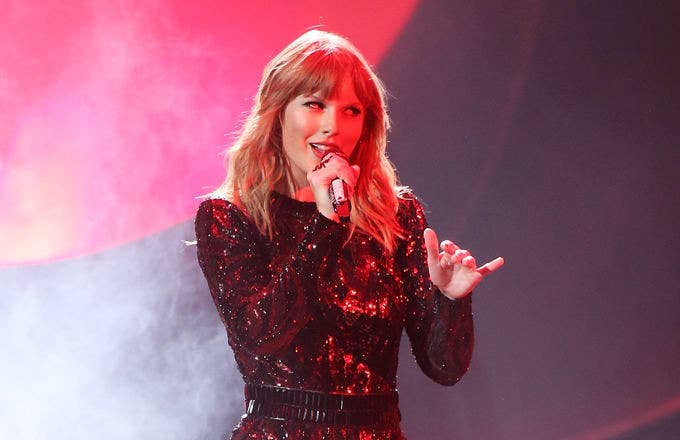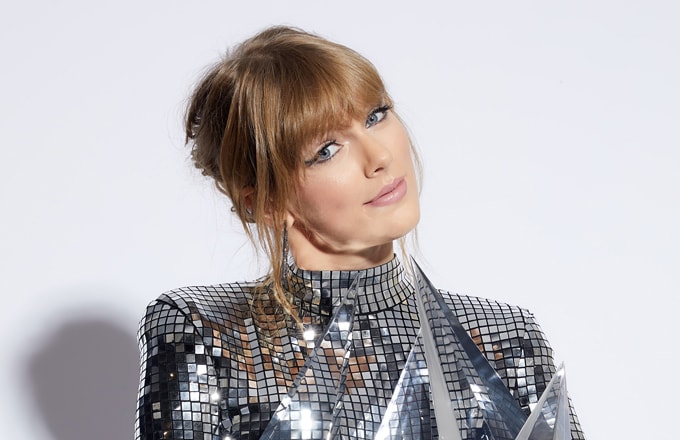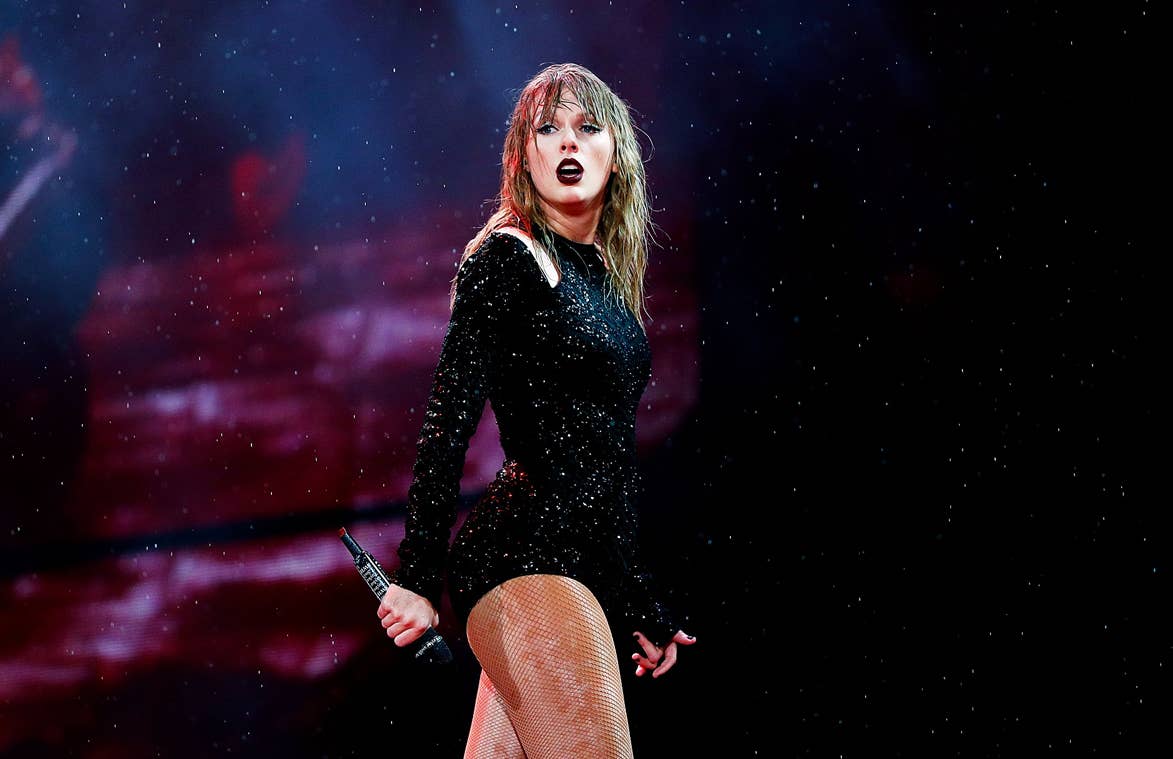
Once again, Taylor Swift is making headlines for a conflict with someone in the music industry who she says has wronged her. But for some Taylor Swift fans, like myself, it is starting to feel a bit like Groundhog Day.
If you’ve somehow managed to avoid the news cycle for the past few days, here’s a quick rundown: Swift's old record label, Big Machine, was sold to Ithaca Holdings (the media company owned by Justin Bieber's manager Scooter Braun) for over $300 million. Then Swift wrote a damning blog post on Tumblr, in which she made it clear that Scooter gaining possession of her back catalog as part of the deal was a bitter pill to swallow. In fact, she felt like Scooter and his clients (which include Bieber and Kanye West) have been “bullying” her for years, so it was the ultimate betrayal for Big Machine's founder Scott Borchetta to sell it to the leader of her enemies, especially because Swift has been trying her best to buy the masters to her past six albums.
Taylor Swift has every right to be upset about the fact that she doesn't own her work, but the way she has handled this situation (and similar confrontations) highlights an infuriating pattern that has developed over the years: Swift has a habit of omitting details during these public disputes, in an attempt to frame a narrative of herself as a victim, even when she doesn't need to.
The first notable example of this took place when she got into her first celebrity relationship with Joe Jonas. After they split in 2008, Swift made an appearance on The Ellen DeGeneres Show and painted a picture of the Jonas Brothers star as a ruthless heartbreaker.
“When I find the right person, I'm not going to be able to remember the boy who broke up with me over in 25 seconds when I was 18,” she told Ellen. The audience gasped, fans were furious, and as a longtime Taylor Swift fan, I was shocked to my teen core. How could he be so heartless? How could he be so cruel to our darling Taylor?
But as Jonas later pointed out, the phone call was only that short because Swift hung up on him while he was trying his best to end things amicably. Ironically, Swift finally made a public apology to Jonas about putting him on blast all those years ago during her latest appearance on Ellen last month. She blamed it on her youth, but unfortunately, it was just the first of many public disputes.

In 2014, Swift released her single, “Bad Blood,” and fans put together the pieces that it was about fellow pop star Katy Perry. The pair's long-running fallout began because Swift thought Perry was trying to sabotage her Red concerts and stole backing dancers. Perry went on to say this was not the case, and the dancers had originally been on tour with her, but began working with Swift while Perry was focused on making new music.
Perry claims that Swift refused to discuss the issue with her. Before long, two of pop’s biggest stars were trading insults through songs and music videos, as Swift flaunted her star-studded ‘You Can't Sit With Us’ girl squad.
In 2015, Nicki Minaj tweeted her frustrations about missing out on nominations at the MTV Video Music Awards, which prompted Swift to leap into defensive mode after assuming the tweets had been aimed at her.
“@NICKIMINAJ I've done nothing but love & support you. It's unlike you to pit women against each other. Maybe one of the men took your slot,” Swift tweeted in response. She was quickly put in her place by Minaj and fans who made it clear that the tweets were about a bigger issue within the music industry, and they had nothing to do with the singer.
Swift apologized, and glossed it all over by inviting Nicki on stage with her, but the incident caused many to wonder what her true motives were during situations like this.
Then, in 2016, Swift's relationship with Calvin Harris came to a sudden and bitter end. Swift moved on to Tom Hiddleston within weeks, but she couldn't entirely drop the beef she seemed to have with her ex. The pair had secretly worked together on his smash hit, “This Is What You Came For,” and the song had been written by Swift under the pseudonym Nils Sjoberg. They had agreed to keep their teamwork secret, but Swift changed her mind after Harris did an interview saying he couldn't see himself working with her on music.
Swift’s team reportedly leaked the information about the song to tabloids, and she was portrayed as a victim who was disrespected by her man, even though she helped write one of his big hits. In response, Harris tweeted, “Hurtful to me at this point that her and her team would go so far out of their way to try and make ME look bad at this stage though... I figure if you're happy in your new relationship you should focus on that instead of trying to tear your ex bf down for something to do.”
Harris then twisted the knife even further and referred to her feud with Katy Perry by adding, “I know you're off tour and you need someone new to try and bury like Katy ETC, but I'm not that guy, sorry. I won't allow it.” Here was another example of her use of defensive victim tactics, straight from the mouth of someone who had been in her closest circles.

The real game-changer came with Kanye West and his wife, Kim Kardashian, in 2016. As everyone knows, Swift and West have a long history that started with the, “I’mma let you finish, but…” moment at the 2009 MTV VMAs, and Swift was undeniably the victim in that situation. She was only 19 and had her special moment ruined live in front of the entire world.
Thankfully, the pair did eventually smooth their much-publicized beef over, and it got to the point where West felt like he could mention her in the lyrics to his 2016 hit, “Famous.” The song includes the line, “I feel like me and Taylor might still have sex/Why? I made that bitch famous,” which was immediately met with shock and disgust by the public. West insisted that he received Swift's approval for the lyric, but her camp told People, “Kanye did not call for approval, but to ask Taylor to release his single ‘Famous’ on her Twitter account. She declined and cautioned him about releasing a song with such a strong misogynistic message. Taylor was never made aware of the actual lyric, ‘I made that bitch famous.’” Swift then made a dig at her frenemy during the acceptance speech for Album of the Year at the Grammys later that month.
In a typical scenario, West would have been forced to follow Swift's narrative, but Kim Kardashian claimed she had a recording of ’Ye and Swift’s phone call, and released it. Proving that West and Swift did talk about her name being mention in the song, the video revealed that Taylor even gave her approval for him to rap about them having sex one day.
The video failed to confirm whether Swift knew he would refer to her as “that bitch,” and she insisted that she never knew the word “bitch” was going to be part of the lyrics. But the question remains: Why didn't she just say West had called, but he hadn't played her the full track? Or perhaps tell fans that he had failed to run the final version by her before release? Why lie entirely and claim he never contacted her when she knew he had? Why was she continuing to omit certain details from these disputes to fit her narrative?
Admitting the conversation took place wouldn't have stopped people from supporting her with regards to West’s choice of lyrics, or for the music video he made for the song. But in her attempt to play the victim, Swift changed the narrative and allowed herself to get caught in a lie.
We saw the damage that incident did to her reputation at the time, and we are now seeing it happen again during her public war of words with Scooter Braun, his wife Yael, Justin Bieber, Demi Lovato, and Big Machine.
During all the back and forth, the former president of the Oprah Winfrey Network and a board member of Big Machine Records Erik Logan reportedly shared a scathing letter, which has since been deleted, claiming that Swift is playing the victim game. “Somewhere you have told a story to yourself that you have the right to change history, facts and re-frame every any story you want to fix with any narrative you wish,” Logan wrote. “But, as someone who has been by Scott's side from before you were born, I'm not going to sit on the sidelines and allow you to rewrite history and bend the truth to justify your lack of understanding of a business deal.” He added, “The facts will come out, you will be proven wrong and people will begin to see that the world you perpetuate, only through your lens, is NOT reality.”
Swift claims that she found out about the deal along with the rest of the world, but Big Machine says her father had known for days, and Borchetta reportedly sent a text to Swift the day before the deal went public. Swift says she wasn't given a fair chance to buy her masters, but Big Machine have released a statement which makes it look like that wasn't the case.
Swift says Braun has been getting his clients to bully her, but Bieber responded by saying that Scooter never asked him to post anything about Swift. We've also learned that Scooter has reportedly tried to reach out and speak with Taylor about the situation.
So, what now? Of course, Swift has every right to be upset about the fact that her work is being sold and not owned by her. But what did years-old “bullying” from Justin Bieber have to do with it? And if she truly wants to find a way to own her masters, then why has she allegedly ignored Scooter’s attempt to reach out after the news broke? With the streams and sales for her old albums getting a major boost from all this drama, the only person winning here is Scooter.
Just weeks ago, we saw Swift make peace with Katy Perry at the end of the music video for her new single, “You Need to Calm Down.” In that moment, many of us let ourselves believe that Swift had grown up and become a wise 29-year-old who had outgrown the need to bend the truth and play victim. Unfortunately, it looks like she still has a long way to go.
Why was she more focused on bringing up an issue from years ago, rather than using the opportunity to highlight the plight of singers and songwriters losing control of their masters? Swift could have focused on the critical issue, but that (more important) issue has been lost amidst a public dispute that isn't benefiting anyone. It’s time for Taylor Swift to stop clinging to the victim narrative.

